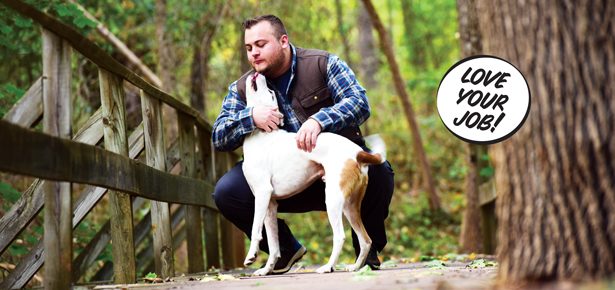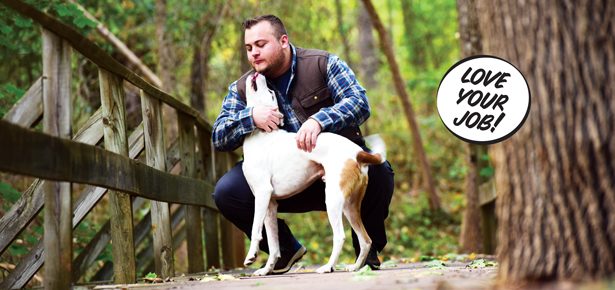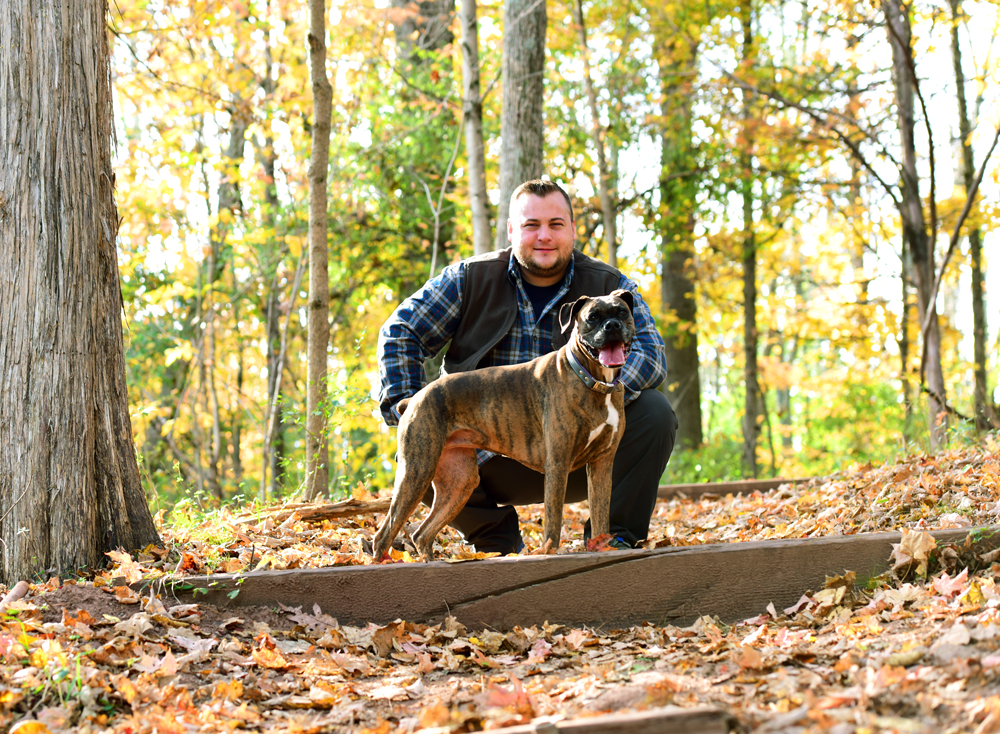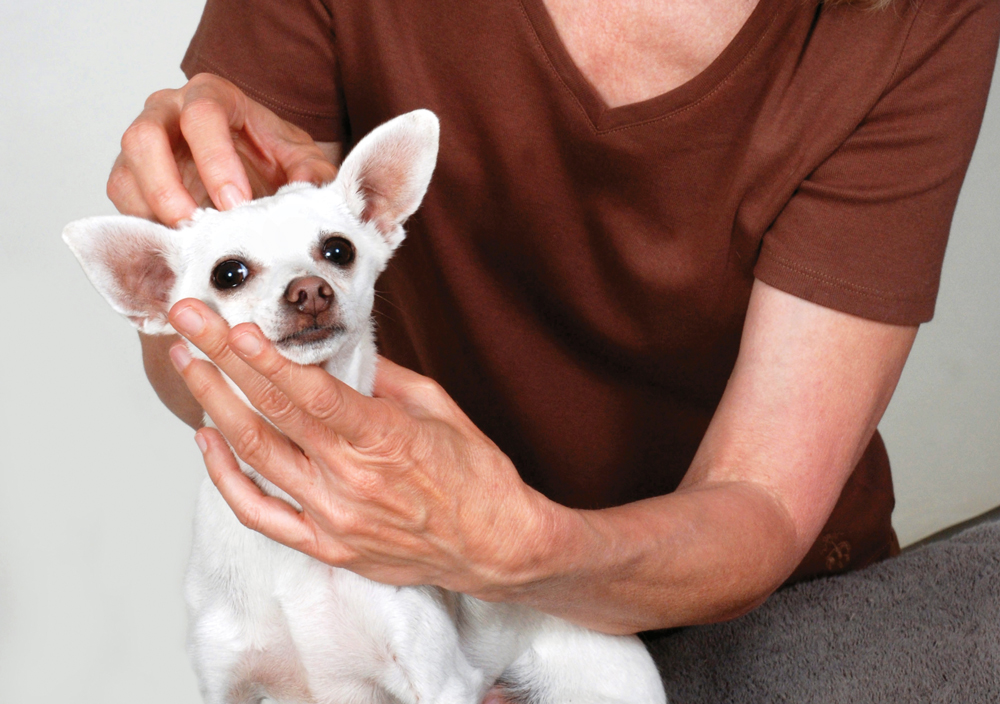

Jobs Working with Dogs
Learn how to turn your passion for dogs into a career. Check out these top 4 career choices for dog lovers!

1. Dog Trainer
A professional dog trainer performs an important service for both dog and human. From helping you teach your pooch basic manners and addressing problem behaviours to advanced training for K9 units, this job requires a lot of skill. There are specialized courses for service dog or K9 unit training, so you’ll need to adapt your skills accordingly.
David Shade, age 32, At Attention Dog Training
I have a long background with the military and suffered from PTSD but turns out this was my path to becoming a dog trainer. I always wanted a dog but never had the opportunity until I got Lulu, my Boxer. Within just a few months she taught me to love and feel again rather than be emotionally numb. She gave my life a purpose.
Next up I spent 18 months at Catch Trainers Academy in New Jersey. I simultaneously worked with Otis, a dog I adopted from the SPCA, read about 30 books about training dogs, and started my own business—At Attention Dog Training—about four years ago. My website was my calling card and I used social media, mainly Facebook, Instagram and Twitter, to try and engage people. And I used Thumbtack, an online site where you can hire specialists to do a job. I bid on jobs, work slowly trickled in, and referrals were like a snowball affect. I started networking: I took business cards to pet stores, vet clinics, dog walkers, and sitters.
I have now trained close to 1,500 dogs and have four employees, including my wife. About 30 – 40 dogs come through our door weekly for training. We also offer in-home training and classes, including one-on-one with your puppy.
The Rundown:
Helpful Traits: Be calm and extremely patient. You need to focus on specific behaviours and issues so it helps to have a history of living with dogs—you need a lot of experience.
Pros: I do what I love and I can pay the bills. I have a better understanding of dogs and people, and I never have to drag myself out of bed to go to work.
Cons: Like the cobbler’s son who doesn’t have shoes, my dogs are the last to get attention at the end of the day. I don’t have time to work with them as much as I want—they get the leftovers.
Running my own company can be rather stressful as it’s up to me to get clients. And passion fatigue is real, not just because I had PTSD. You see so many problems and neglect in the dog world that can make you numb and apathetic. But I take a few days off to center and come back to my purpose: keep dogs happy in happy homes.
Estimated Salary: I pay my dog trainers $40K a year if they work 40 hours a week. Expect less if you working at a corporate training store. You get what you pay for.
2. Small Animal Massage Specialist
What could be more rewarding than making dogs feel better by improving an animal’s overall wellbeing with your touch? For the past 18 years, Nicola Way has provided therapeutic massage and rehabilitation for dogs experiencing muscular degeneration and neurological issues.
Nicola Way, age 50, Vancouver Animal Massage
First and foremost, my services are not a substitute for veterinary care. Vets refer dogs to me for muscular problems such as strains, sprains or trauma that have resulted in an injury. Referrals allow me to know exactly where to focus. Massage can also help when there has been damage to some part of the nervous system such as a herniated disc or spinal cord damage that results in neuropathy.
Massage also improves flexibility and relieves tension, and so it can also help with arthritis and age-related issues. While a veterinarian can help arthritis symptoms with pain management, gentle massage triggers blood flow and rids toxins in a certain area—you want to keep a dog supple as possible.
Like people, not all dogs like hands on them. If they have been in abusive situations or in extreme pain they may be fearful, but most dogs relax and enjoy. Someone may tell me their dog was fine last night but cannot get up today. I always advise them to call their vet first. A vet always refers me for a reason—not for Fluffy’s birthday.
Animal massage in the U.K. is common, and it was always my career choice. I moved to Canada from the U.K. in 1996 and there wasn’t anywhere offering courses so I went back to England and studied. I also took an 18-month course in cranial-sacral anatomy and internal workings in Oregon, a course taken by vets so the bar is high. And I took a one-year course with the Northwest School of Animal Massage in Washington State, became certified and advertised in the local newspaper. My phone rang immediately. I also offered my services at vet clinics, and the majority of my clients are vet-referred.
The Rundown:
Helpful Traits: Be calm and patient. Sometimes I treat puppies with growing pains: they can be wiggly with the attention span of a flea. I have to read animal body language so there is no room for my stress. Practice yoga.
Pros: It’s very rewarding and fulfilling to see improvement in function or at the very least maintain function. Many dogs have a temporary injury so you can see results over a few sessions. Plus, by being my own boss, I am in control of my time.
Cons: It does take a toll on your body with so much bending and leaning needed to treat animals on the floor, especially as you get older. When I started in my early 30s, being self-employed was stressful. Fortunately, I live in a very pet-friendly city – a lot depends on where you live. Courses are expensive and time-consuming, and you must understand anatomy.
Estimated Salary: $30K to 60K full time.
3. Dog Behaviourist/ Companion Animal Behaviour Counselor
If your pooch is behaving badly, say, destroying your home, who are you gonna call? A dog behaviourist! These canine psychologists and therapists can help with issues such as separation anxiety and aggression. A board-certified behaviourist has studied applied canine behaviour and must meet the requirements of either an independent certifying board or an approved veterinary school. Behaviorists are experts in behaviour modification and can teach you how to understand and work with your pup. With additional formal education, they can be certified as an Applied Animal Behaviourist. A skilled behaviourist can help transform your monster mutt into a perfect pooch.
Shari Forst, age 53, Co-owner, Canine Case Squad
I got started in my early 20s. I took my puppy to obedience school, loved it, and started my apprenticeship there. Eight hours a day for over a year I cleaned kennels, fed, and cared for about ten dogs at any given time. And I did obedience training, either at the school or at a client’s home. At the time, my husband and I had two German Shepherds who were well-trained since puppyhood but they started fighting in the house. Neither of us understood animal psychology so we tried to work with a behaviourist in Florida but it was far away; Prozac and muzzling were recommended and we didn’t want that. Instead we wanted a behaviour modification program and found a man who was a certified dog trainer and had a PhD in animal behaviour. He urged us to take some canine psychology classes—which took three intense years.
Now I am a Board Certified Companion Animal Behavior Counselor, and certified with the American Foundation for Animal Rescue in the area of Dog Training and Instructor Skills. I also teach classes in applied canine behaviour on staff as a behaviourist for the local Humane Society and I’ve testified as an expert witness.
After getting certified in 2007, I called all the veterinarians in Orange County asking for a meeting but most of them weren’t interested. I didn’t take ‘no’ for an answer. With my (now) well-behaved dogs I talked to staff at vet clinics and one vet agreed to talk after I explained the difference between a dog trainer and behaviourist. I got a few referrals and word spread. We also get referrals from trainers who can’t deal with aggression. Today we have hundreds of clients including some from other states and even from Canada.
The Rundown:
Helpful Traits: Self-confidence, patience, and you have to be in good physical condition. This job is not for the faint-hearted.
Pros: It’s most rewarding to turn an aggressive dog around and get positive results with client compliance. We have our own business and two wonderful ladies also work here.
Cons: Not having client compliance. For instance, we recently had a tough anxiety case. This dog would hurt herself in a kennel or flip out and destroy the house. She stayed with us for two weeks; we worked very hard to build her confidence and help her learn to relax. We gave the client written instructions and video clips but when she came back for a follow-up nothing had been done. The dog was cowering in the corner. We get you 85 percent of the way there but you have to implement the 15 percent at home. Thankfully most clients comply, knowing their dog’s life depends on it.
I’ve had a few nasty bites. It’s like being a boxer—you get punched a few times but it doesn’t faze you anymore.
Estimated Salary: A lot depends on the area. We pay one woman who works with us in Tennessee $2,800 over a two-week period.
4. Pet Shop Owner
The pet shop business is a great way to share your animal passion with like minds. Over time, your entrepreneurial spirit and product knowledge will establish relationships with customers concerned about the welfare of their pets.
Alexis Murphy, age 38, Co-owner, Long Live Cats and Dogs
We began this business to help pets, educate consumers, and allow people to make informed decisions when it comes to their pet’s health and longevity.
Long Live Cats and Dogs got started eight years ago. I had to take the bus in the pouring rain to buy cat litter so my friend (and now partner) Kristy Clark offered to drive me—there wasn’t a pet store nearby. We decided right then and there to open a store and four months later we did just that. We found a location and Googled ‘how to open a pet food store.’ It was exciting and completely different from our regular jobs. Kristy is a social worker and I’m a radiologist technician. We kept our jobs because it took the store four years to make money and pay ourselves. We considered the store more like a hobby but never as a wrong choice. We moved to a bigger location with a larger inventory (against our accountant’s advice) and started to turn a profit. And we started another business: Neuterhead, a non-profit that raises money for rescue groups, and we are proud of raising a lot of money. We put on a rock and roll show, sell merchandise, and distribute the money to dog and cat rescue groups.
We both had lots of pets growing up. Kristy has two dogs and several cats, so owning a pet food and supply shop was a natural progression. I still work part time at the hospital; we have two managers running the store and we all make a comfy living.
The Rundown:
Helpful Traits: Outgoing, a “people person”, resilient, hard-working, positive attitude, and patient. Trust yourself and your partner. Bonus: Have an encyclopedic knowledge of animals and a good knowledge of animal nutrition.
Pros: Creating something on your own, building your own niche, is so rewarding. We have the freedom to choose products and supplies and can offer more personalized service than big-box stores. You become part of the community and meet so many interesting people—and their pets.
Cons: Financially, it’s risky and stressful—that is why we kept our jobs. We invested all of our savings—about $30K, but we eventually made it back. Your social circle shrinks because the store is time-consuming and it can be exhausting. Some items don’t sell so you have to be forgiving with yourself, take the losses with a grain of salt, move forward and don’t dwell on the past.
Estimated Salary: After four years the store nets (take home) about 70K per year.
What is your ideal job working with dogs?
Join the newsletter and never miss out on dog content again!
"*" indicates required fields
By clicking the arrow, you agree to our web Terms of Use and Privacy & Cookie Policy. Easy unsubscribe links are provided in every email.


